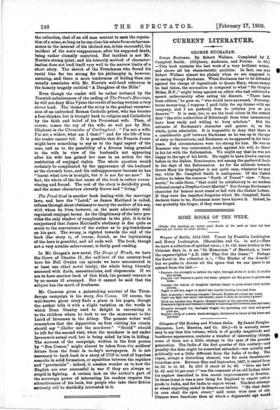CURRENT LITERATURE.
GEORGE BUCHANAN.
George Buchanan. By Robert Wallace. Completed by J. Campbell Smith. (Oliphant, Anderson, and Ferrier. ls. 6d ) —This book contains the last work of a very brilliant writer, and shows all his characteristic qualities. In fact, one sees Robert Wallace almost too plainly when we are supposed to be seeing George Buchanan. When Buchanan has to be defended against the charge of ingratitude to Queen Mary, whose money he had taken, the accusation is compared to what " Sir Gorgius Midas, M.P.," might bring against an editor who had criticised a speech unfavourably after eating his dinners. " There have been editors," he goes on, " who would have answered, ' Presump. tuous money-bag, I suppose I paid fully for my dinner with my company, and I am perfectly free to criticise you as you deserve.' " It is easy, too, to see the local colour in the remark that "the civic authorities of Edinburgh from time immemorial have been ready and willing to bury scholars." But the estimate of Buchanan's character and genius is, on the whole, quite admirable. It is impossible to deny that there is a considerable gulf between Buchanan as he was up to the age of sixty or thereabouts, and Buchanan as he appeared in his later years. But circumstances were too strong for him. He was an Erasmus who was constrained, much against his will, to throw in his lot with the Reformation. We might say that he was not happy in the age of his birth. He ought to have lived a century before in the Italian Renaissance, not among the perfervid Scots in the days of the Reformation. As for his attitude towards Queen Mary his biographer is not quite easy, whatever he may say, while Mr. Campbell Smith is ambiguous. Of the Casket Letters he takes the common "North of Tweed" view. "Docu- ments," he calls them, " that could be satisfactory to no modern tribunal except a Dreyfus Court-Martial." But George Buchanan's character for honour must stand or fall with the Casket Letters. If they were the manifest forgeries which Mr. Campbell Smith declares them to be, Buchanan must have known it. Indeed, he was probably the forger, if they were forged.






































 Previous page
Previous page